
JAMA Cardiology
Scope & Guideline
Exploring the Frontiers of Cardiovascular Medicine.
Introduction
Aims and Scopes
- Clinical Trials and Evidence-Based Medicine:
The journal consistently features studies from randomized clinical trials, focusing on the efficacy and safety of various cardiology interventions, medications, and therapies. - Cardiovascular Risk Assessment and Management:
Research on risk factors, including genetic, demographic, and lifestyle variables, plays a prominent role, emphasizing the need for personalized approaches in cardiovascular care. - Innovative Diagnostic and Therapeutic Strategies:
The journal highlights advancements in diagnostic tools, imaging techniques, and treatment modalities, particularly those that incorporate technology such as artificial intelligence and machine learning. - Health Disparities and Social Determinants of Health:
Increasing attention is given to the impact of socioeconomic factors and disparities in cardiovascular health outcomes, reflecting a broader commitment to health equity in the field. - Emerging Cardiovascular Conditions:
There is a growing emphasis on less common cardiovascular diseases and conditions, such as amyloidosis and rare genetic disorders, indicating the journal's aim to cover a wide spectrum of cardiovascular health.
Trending and Emerging
- Integration of Technology in Cardiology:
There is a notable increase in studies utilizing machine learning, AI, and digital health technologies for diagnostics and treatment optimization, showcasing the journal's embrace of innovation. - Diversity and Inclusion in Cardiovascular Research:
Recent publications emphasize the importance of studying diverse populations and addressing health disparities, reflecting a commitment to understanding cardiovascular health across different demographics. - Personalized Medicine Approaches:
An emerging focus on personalized treatment strategies, including genetic testing and tailored therapies for individuals, demonstrates a shift towards precision medicine in cardiology. - Impact of Lifestyle Interventions:
Research exploring the effects of lifestyle modifications and community-based interventions on cardiovascular health outcomes is gaining prominence, indicating a holistic approach to patient care. - COVID-19 Related Cardiovascular Implications:
The journal has increasingly published studies examining the cardiovascular consequences of COVID-19, reflecting a timely response to a global health crisis.
Declining or Waning
- Traditional Risk Factors Focus:
Research solely centered on traditional cardiovascular risk factors (e.g., hypertension, hyperlipidemia) seems to be less frequent, as more complex and multifactorial approaches to risk assessment gain traction. - Basic Science Research:
There is a noticeable reduction in basic science studies that do not directly correlate with clinical outcomes, as the journal shifts towards translational and clinical research. - Single-Center Studies:
The prevalence of single-center studies appears to be declining, with a shift towards multicenter and larger cohort studies that offer more generalizable findings. - Conventional Treatment Comparisons:
Papers comparing standard treatment modalities without innovative approaches or new insights are becoming less common, signaling a preference for studies that explore novel therapies or combinations. - General Cardiovascular Education:
Publications focusing solely on general education about cardiovascular diseases without new research findings or clinical implications are increasingly rare.
Similar Journals
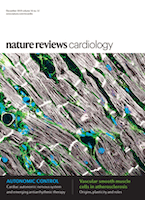
Nature Reviews Cardiology
Unveiling Insights that Shape Cardiac CareNature Reviews Cardiology, published by NATURE PORTFOLIO, stands as a premier academic journal in the field of cardiology and cardiovascular medicine, boasting an impressive impact factor and a distinguished ranking of #1 out of 387 in Scopus. Since its inception in 2009, this exemplary journal has continuously delivered cutting-edge reviews and insights, supporting researchers, healthcare professionals, and students in navigating the complex landscape of cardiovascular health. With a commitment to providing open access and disseminating rigorous research, Nature Reviews Cardiology captures the forefront of innovation and scholarship, critical for facilitating advancements in cardiovascular science and clinical practice. Situated in the United Kingdom and with a vibrant global readership, this journal perpetuates academic excellence, ensuring accessibility to the latest findings that shape prevention, diagnosis, and treatment strategies in cardiology through to 2024 and beyond.

International Cardiovascular Research Journal
Empowering the future of cardiovascular medicine through open access.International Cardiovascular Research Journal, published by Shiraz University Medical Sciences, serves as a vital platform for the dissemination of cutting-edge research in the field of cardiology and cardiovascular medicine. Since its inception in 2011, this journal has continuously devoted itself to promoting the highest quality of scholarly communication, helping to bridge the gap between laboratory findings and clinical application. With an ISSN of 2251-9130 and an E-ISSN of 2251-9149, it is indexed in prominent databases, contributing to its visibility and accessibility to a global audience. Although currently classified in the Q4 quartile in the 2023 rankings, the journal is committed to enhancing its impact factor and academic stature. It aims to facilitate open access for all published articles, although specific details on access options are pending. Through its rigorous peer-review process and diverse scope—which encapsulates advancements, clinical studies, and innovative therapeutic strategies—this journal fosters academic collaboration in the realm of cardiovascular health, making it an invaluable resource for researchers, practitioners, and students alike.
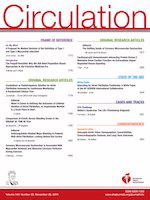
CIRCULATION
Driving Discoveries in Cardiovascular Health Since 1950.CIRCULATION is a premier journal in the field of cardiology and cardiovascular medicine, published by Lippincott Williams & Wilkins. With a distinguished history dating back to 1950, the journal has consistently been at the forefront of critical research, showcasing significant advancements and discoveries in cardiovascular health. It holds a remarkable Q1 ranking in both the fields of Cardiology and Physiology (medical) according to the 2023 category quartiles, demonstrating its influential role among the top publications in these disciplines. With an impressive Scopus ranking, placed 3rd out of 387 in Cardiology and 2nd out of 113 in Physiology, CIRCULATION is essential reading for researchers, practitioners, and students passionate about advancing their understanding of heart health and related medical sciences. Although the journal is not open access, it continues to foster scholarly exchange and innovation in cardiovascular research, making it an indispensable resource for quality insights and groundbreaking studies.

Journal of Atherosclerosis and Thrombosis
Leading the charge in cardiovascular research excellence.Journal of Atherosclerosis and Thrombosis is a leading academic publication dedicated to advancing research in the fields of cardiovascular medicine, biochemistry, and internal medicine. Published by the Japan Atherosclerosis Society, this esteemed journal operates from its headquarters in Tokyo, Japan, and has been a vital resource in its area since its inception in 1994. With its robust impact in Cardiology and Cardiovascular Medicine, ranking in the top quartile (Q1) as of 2023, and a commendable standing in Internal Medicine and Biochemistry, the journal fosters an environment of innovation and discovery, showcasing significant studies and advancements that shape clinical practices and therapeutic approaches. Though not an open-access publication, it offers a wealth of insights to researchers, professionals, and students seeking to deepen their understanding of atherosclerosis and thrombosis. By continually featuring high-quality articles, the Journal of Atherosclerosis and Thrombosis plays an essential role in bridging the gap between research and practice, facilitating critical conversations that influence the future of cardiovascular health.
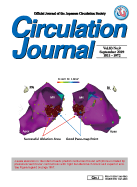
CIRCULATION JOURNAL
Empowering Cardiovascular Innovation Through Open Access.CIRCULATION JOURNAL, published by the Japanese Circulation Society, stands as a premier platform for cutting-edge research in the fields of Cardiology and Cardiovascular Medicine. With an impressive impact factor placing it in the Q1 quartile for both cardiology and general medicine, this journal is essential for researchers and practitioners seeking to stay at the forefront of cardiovascular science. The journal's accessible open access options ensure that groundbreaking studies are widely disseminated, reflecting its commitment to advancing medical knowledge and improving patient care. Since its inception in 1996, CIRCULATION JOURNAL has fostered a global dialogue on vital cardiovascular issues, making it a vital resource for academics, healthcare professionals, and students alike. With its base in Tokyo, Japan, the journal not only highlights regional advancements but also contributes significantly to the global medical community.
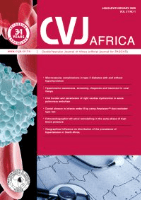
Cardiovascular Journal of Africa
Transforming cardiovascular care through shared knowledge.Welcome to the Cardiovascular Journal of Africa, an esteemed publication dedicated to advancing the fields of Cardiology and Cardiovascular Medicine. Established in 1994 and published by CLINICS CARDIVE PUBL PTY LTD, this journal serves as a vital platform for researchers, practitioners, and students interested in innovative cardiovascular research and clinical practice within the African context and beyond. With a Q3 ranking in both relevant categories as of 2023, this journal contributes significantly to the growing corpus of medical literature. Although access is non-open, the journal features a diverse array of peer-reviewed articles that explore groundbreaking findings and practical applications in cardiovascular health, fostering knowledge exchange among professionals. Situated in South Africa, the Cardiovascular Journal of Africa is not just a repository of academic research; it is a cornerstone in the fight against cardiovascular diseases, addressing the unique challenges faced by populations across the continent.

HEART
Transforming Cardiac Care Through Scholarly InsightsHEART is a leading peer-reviewed journal published by the BMJ Publishing Group, specializing in the field of Cardiology and Cardiovascular Medicine. Established in 1942, the journal has evolved as a premier platform for disseminating high-quality research, innovative practices, and clinical advancements within the cardiovascular domain. With an impressive impact factor and ranked in the Q1 category in 2023, it positions itself among the top-tier journals in its field, boasting a Scopus rank of #37 out of 387 in this highly competitive area, representing the top 10th percentile nationally. The journal supports both traditional and open access options, thereby enhancing the global visibility and reach of its published work. Researchers, professionals, and students alike will find HEART to be an invaluable resource, offering the latest insights and developments that drive the field forward and improve patient care worldwide.

Cardiology Journal
Connecting researchers to critical cardiac discoveries.Cardiology Journal, published by VIA MEDICA, stands as a prominent resource in the field of cardiology and cardiovascular medicine, with an ISSN of 1897-5593 and an E-ISSN of 1898-018X. Recognized for its Open Access model established since 1994, this journal facilitates widespread dissemination of critical research findings, allowing practitioners and researchers globally to access valuable insights without barriers. Based in Poland, with an address at UL SWIETOKRZYSKA 73, 80-180 GDANSK, it has achieved a respectable Q2 classification in 2023 for both Cardiology and Miscellaneous Medicine categories, reflecting its influence and quality within the scholarly community. With a Scopus ranking placing it at #117 out of 387 in Cardiology, it lies within the 69th percentile, underpinning its commitment to advancing knowledge in cardiovascular health. The journal’s converged years extending from 2006 to 2024 ensure it captures ongoing developments in a rapidly evolving field. As such, the Cardiology Journal serves as an indispensable platform for researchers, professionals, and students dedicated to exploring the frontiers of cardiac science and improving patient care.

Netherlands Heart Journal
Fostering Innovation in Heart Health Through Scholarly DiscourseNetherlands Heart Journal is a premier academic publication dedicated to advancing knowledge in the field of cardiology and cardiovascular medicine. Published by BOHN STAFLEU VAN LOGHUM BV, this journal has established itself as a critical platform for researchers, professionals, and students seeking to explore groundbreaking findings and innovative practices in cardiovascular health. With an ISSN of 1568-5888 and E-ISSN 1876-6250, the journal boasts a respectable Q2 ranking in the Cardiology and Cardiovascular Medicine category, placing it in the top half of its field according to the 2023 quartiles. The Scopus ranking places it 130th out of 387 in the relevant category, indicating a commendable percentile rank of 66th, which attests to its influence and quality of published research. Spanning from 2005 to 2024, the journal endeavors to include a diverse array of topics, encompassing clinical practice, technological innovations, and public health considerations related to cardiovascular diseases. Researchers and practitioners are encouraged to engage with the journal's robust content, contributing to and benefiting from the collaborative effort to enhance cardiovascular health worldwide.
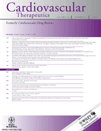
Cardiovascular Therapeutics
Empowering Global Access to Cardiovascular DiscoveriesCardiovascular Therapeutics is a renowned Open Access journal, published by WILEY-HINDAWI, that has been at the forefront of advancing knowledge in the field of cardiology and cardiovascular medicine since its establishment. With a strong commitment to disseminating high-quality research, the journal has successfully positioned itself within the Q2 quartile in multiple categories, including Cardiology and Cardiovascular Medicine, Medicine (miscellaneous), and Pharmacology. The journal is indexed in Scopus, achieving impressive rankings, such as #95 out of 387 in Cardiology, and #87 out of 272 in Medical Pharmacology. Situated in the United Kingdom, Cardiovascular Therapeutics embraces an Open Access model since 2019, ensuring that groundbreaking research is accessible to researchers, practitioners, and students across the globe. The journal is dedicated to publishing original research articles, reviews, and clinical studies that contribute to the understanding and treatment of cardiovascular diseases, making it an essential resource for those invested in improving patient outcomes and advancing therapeutic strategies in this vital area of medicine.